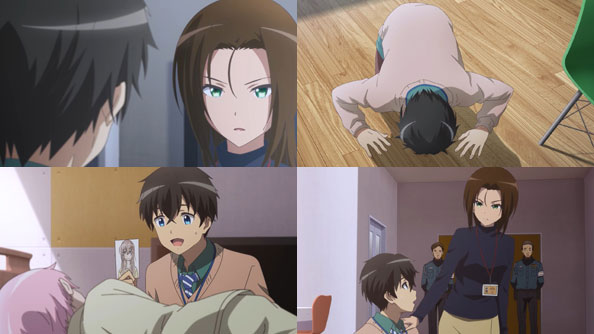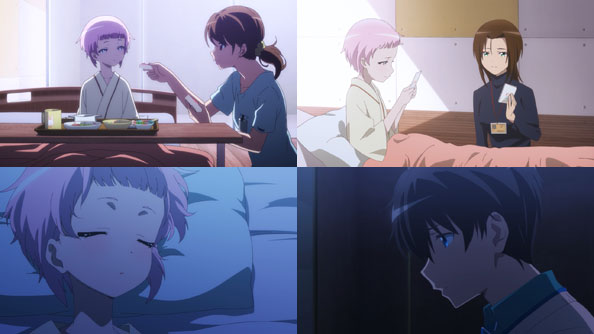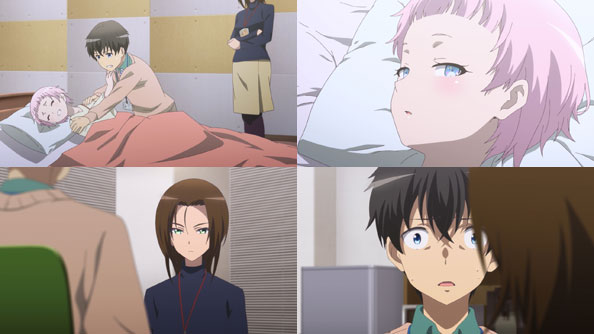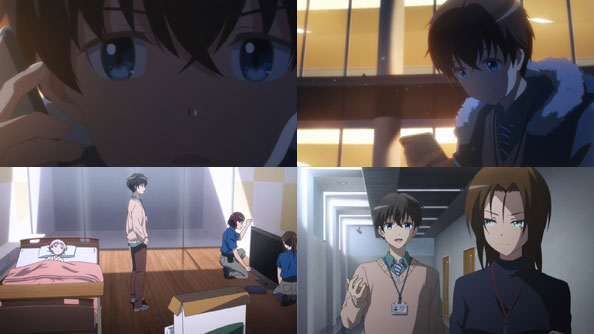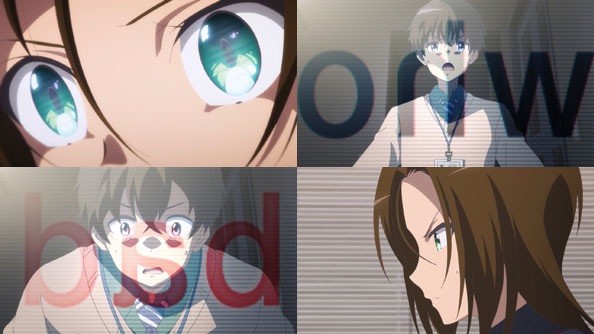Up to this point, The Day I Became a God had told a compelling and reasonably plausible sci-fi tale about a child who was given a new lease on life (i.e. “became a god”) thanks to bleeding-edge technology, only to have that tech stripped away when the ramifications of its wider use were considered too constructive.
That decision was made by the highest world powers who had to that point played no role in the narrative, and play no role afterwards. Thanks to Suzuki Hiroto’s hacking, Youta is able to find the Hina who is no longer a god and even gain entry to her care facility.
Youta put the consequences of his fraud out of his mind because he held out hope one more miracle would occur: Hina would not only remember him and their happy summer together with his friends and family, but make the decision to return home with him.
Rather than accept the new normal and move forward, Youta insisted on getting everything back to the way it was—on moving backward. And while I certainly sympathized with, and may even have acted as he did in his position, in the end he was wrong, and misguided. Just being in that facility under false pretenses marked him as a criminal.
Throughout the sanitarium part of the series, Shiba had been painted as Youta’s adversary; his rival for the deciding of Hina’s future. It was even implied Shiba had a personal stake in remaining in the here-and-now Hina’s care, which is considerable and not to be undertaken lightly. This week she confronts him about his fraud, but rather than expel him immediately from the facility and turn him over to the police, she gives him One More Day.
The show had me until then, then lost me as soon as that decision was made. I understand this is a fictional show that makes choices out of dramatic license, but for someone who claims to be so committed to Hina’s health and safety, Shiba’s “small kindness” to Youta is as baffling as it is reckless.
Sure, we may know Youta means no harm, but have neither the training or experience to know the extent of how much he may harm her nonetheless. Shiba does, and rather than immediately remove a potential agent of further harm, she lets him not only linger, but take Hina away.
Youta is depicted as being at his lowest point as he’s roughly escorted out of the facility to a waiting car. That should be it, but Shiba takes Hina out into the freezing cold to allow for an extended goodbye, during which it dawns on Youta why Hina kept discarding the card with the drawing of him. The real him was already there, unlike the others, so his card wasn’t needed.
With the real Youta now about to be “missing” Hina verbally protests, repeating how she “loves Yoha[sic]”, jumping out of Shiba’s arms, steadying herself, then walking barefoot into his waiting arms. Finally, Youta has evidence that her memories aren’t gone. She remembers him and his family and friends.
The Hina he knew is still “in there”, merely in a more frail body with a smaller vocabulary, and we can deduce that she wants him to remain in her life.
And hey, that’s great! It really is! But Hina remembering Youta, and even declaring she loves him, doesn’t mean he can immediately take her back home like nothing happened! Shiba was preparing to take Hina to a better facility overseas, implying that the current facility—clearly no slouch itself—wasn’t quite up to spec in terms of being the best place for Hina’s continued care and development.
Youta’s house may be a loving home, but I have to question whether Youta and his parents truly have Hina’s best interests at heart. None of them have caregiver training for special needs children. Worse, Youta returns home immediately, and it’s clear his house hasn’t been modified for Hina’s needs.
If there were plans for Shiba to take Hina abroad, why would she simply give up guardianship and custody to someone she knew was a high school student pretending to be a pediatric researcher? At the very least, Shiba would move into Youta’s house to help with Hina. I’m sorry, but none of these events make any logical sense if you push past the emotional manipulation and think about any of it for one second.
Instead, things carry on as if Hina had simply been kidnapped and returned safe and sound. Youta figures out that the things she did as “Odin”—playing basketball, eating ramen, making a film, etc.—were things the pre-chip Hina wanted to do but couldn’t due to her Logos Syndrome. But then why did pre-chip Hina want to revitalize a restaurant…or get Youta laid by a mahjongg otaku??
Youta decides that Hina always was a god, and even remains one, and credits her with helping him decide his path in life: he’ll go to college to become the foremost researcher on her condition. Wonderful sentiments, but the fact of the matter is he is woefully ill-equipped to help her now.
While he’s plugging away at the books (pre-med is no joke), Hina will need 24-hour care. Assuming he’ll leave that to his parents, will they get the training they need? Again, the fact Shiba simply vanishes without a trace is maddening.
Sora finally finishes her movie, which turns out to be a reflection of Youta and Hina’s arc: a guy rescuing a girl the world needed sacrifice in order to save it. The film sidesteps what effect the actual end of the world would have on their happiness; I guess they’d just enjoy their lives together until the oxygen ran out, because that’s better than being apart and the world going on?
The film is followed by the making-of segments, during which Hina sits down and gets real about her time on the earth with Youta & company. She likens the memories she’s made with them to be a chest full of dazzling jewels she’ll treasure for all of her days—even if “the world should end.”
You’d be forgiven for tearing up during this scene, as with other touching scenes designed to invoke tears. Youta and the others were tearing up. Heck, I teared up too! But once the tears dried, I was simply frustrated to the point of indignation.
This was a show that had all the resources to deliver a realistic ending, in which the acceptance of the loss and change in Youta’s life would spur his own growth and change, bolstering the change God-Hina had already caused. The previous two episodes paved the way for that kind of ending. It would have been difficult, and sad, but it would have felt genuine.
Instead, the show took the easy way out and gave Youta everything he wanted in a painfully artificial happy ending that shredded all previous nuance or appeals to realism. There are no apparent consequences for the fraud he committed, nor for removing Hina from a highly-controlled care facility and dropping her into the chaos of his family and friends.
Youta claims to now know the path he wants to walk, but reached that epiphany only after being unjustly rewarded for his missteps and ignorance. He learned that if he was stubborn and passionate enough, all obstacles would fold and he’d get his way…and they did. Finally, the less said about any romantic undertones to his bond with Hina, the better. I wish this ending didn’t leave such a bitter taste in my mouth, but here we are.

